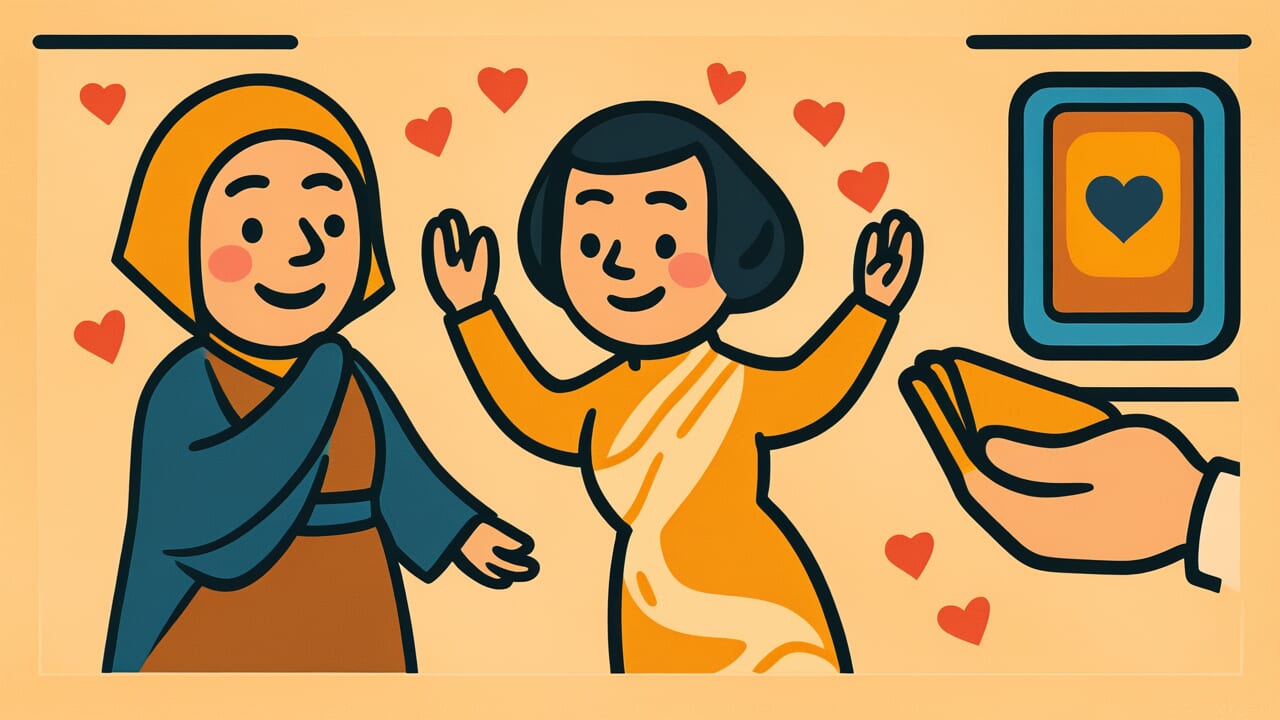How to Read “Love given returns as love, fortune sent comes back as fortune”
Ai izuru mono wa ai kaeri, fuku yuku mono wa fuku kitaru
Meaning of “Love given returns as love, fortune sent comes back as fortune”
This proverb shows how relationships work both ways. When you give love to others, love comes back to you. When you bring happiness to others, happiness comes to you.
If you show love and kindness to people, it will circle back to you. When you wish for others to be happy and help make it happen, your own happiness will come too.
People use this proverb when teaching about being kind to others. It’s also used to show why doing good things without expecting rewards is valuable.
The proverb teaches that caring about others, not just yourself, leads to your own happiness. Today, people sometimes call this “give and take.”
But this proverb means something deeper. It’s not about making deals. It’s about pure kindness flowing in a circle.
Origin and Etymology
No clear written records show exactly where this proverb came from. But we can learn interesting things by looking at how it’s built.
The proverb has two matching parts: “Love given returns as love” and “fortune sent comes back as fortune.” This matching style likely came from ancient Chinese philosophy, especially ideas about cause and effect.
Buddhist teachings about “cause and result” and Confucian ideas about “good deeds bring good rewards” came to Japan. These ideas became part of Japanese language and culture.
Look at the action words used: “given,” “returns,” “sent,” and “comes back.” The proverb treats love and fortune as things that move from person to person, not as things that just sit still.
The word “returns” shows that love you give will circle back to you. The words “sent” and “comes back” show that when you send happiness to others, it travels back to you.
During Japan’s Edo period (1603-1868), common people learned these teachings about cause and effect. This proverb became part of how people lived their daily lives.
Usage Examples
- She always cares about people around her, so everyone helps her when she’s in trouble. That’s truly “Love given returns as love, fortune sent comes back as fortune”
- I kept doing volunteer work, and then someone helped me when I least expected it. I guess it’s “Love given returns as love, fortune sent comes back as fortune”
Universal Wisdom
People have passed down this proverb because it perfectly describes how human society really works. People can’t live alone. We can only feel happy through our connections with others.
What’s interesting is that this proverb isn’t just a moral lesson. It describes how relationships actually work in real life.
People naturally gather around those who give love and kindness. It’s not because of calculation. People are drawn to warmth. On the other hand, people move away from those who only think about themselves.
Think deeper about this proverb. It shows the order matters: “giving” comes before “receiving.” You must first give love and send fortune to others.
Don’t give while expecting something back. Give purely, and then it naturally returns to you. If you reverse this order, the proverb loses its true meaning.
Humans have a natural feeling to repay kindness they receive. Psychology calls this the “reciprocity principle.” Our ancestors understood this from experience.
That’s why this proverb still touches people’s hearts across different time periods.
When AI Hears This
Network science research shows something fascinating. Friendly people gain relationships at an accelerating speed, and math can explain this. Scientists call it “preferential attachment.”
Imagine two people: one has 10 friends, another has only 1 friend. When someone new meets them, they’ll probably choose the person with 10 friends. Popular people become even more popular.
Apply this rule to love and kindness, and you see surprising facts. Kind people get remembered as “someone I want to meet again.” They get more introductions and invitations.
Their network doesn’t grow in a straight line. It grows exponentially. If you’re kind to 100 people, you don’t just get 100 returns. Each person might bring others, creating hundreds or thousands of indirect connections.
Small-world theory says human relationships connect anyone in the world through an average of 6 steps. This means the kindness you give out can return through unexpected routes in surprising ways.
Social media analysis shows that people who post positive content gain followers 2 to 3 times faster. This proverb understood the mathematical amplification effect of network structures through experience alone.
Lessons for Today
Modern society focuses so much on efficiency and results that we sometimes measure relationships by profit and loss. But this proverb reminds us of something important: start by giving.
If you only care about social media “likes” or immediate returns, you’ll lose sight of what really matters. This proverb teaches us to think about relationships over a longer time.
The kind words you say today or the small help you offer might not come back right away. But they definitely stay in someone’s heart somewhere. Eventually, they’ll return to you in unexpected ways.
The important thing is to give without expecting anything back. When you calculate what you give, it’s no longer love. Only pure kindness truly circulates.
If you want warm relationships around you, start by giving love yourself. Wish for others’ happiness. That’s actually the shortest path to your own happiness.


Comments